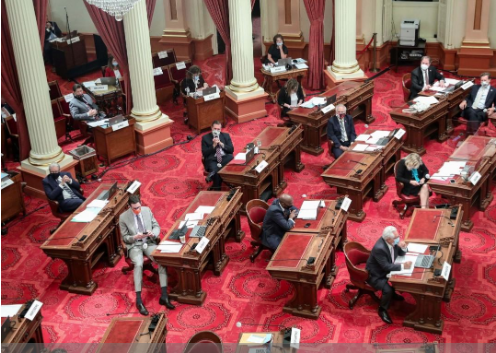For the legislative and political week June 29-July 3
Welcome to the June 29 issue of the NFIB California Main Street Minute from your small-business-advocacy team in Sacramento.
- A new bill giving businesses with 25 or fewer employees some liability protection from COVID-19 lawsuits emerged Friday. Its authors are Democrat Assemblyman James Ramos of Highland and Assemblyman Chad Mayes, an independent from the Yucca Valley. In an interview for Politico, State Director John Kabateck called it a proposal with great promise.
- The November ballot is almost fully formed. NFIB will dedicate most of its resources on defeating the attempt to remove Proposition 13 property tax protections, and is reviewing the 10 additional measures that will be on the ballot. Ones of particular note include a measure to impose even more onerous data-privacy rules on Californians than the original CA Consumer Privacy Act, which has yet to take effect (July 1), and another that would greatly expand local governments’ power to control rents on residential properties, which is not an issue NFIB usually engages in.
- Why did we say ‘the November ballot is almost fully formed’ above? The deadline was June 25 for the Legislature to place initiatives on the ballot. Because of the budget and other matters, the Senate was late in getting around to placing two Assembly Constitutional Amendments on the November ballot. No problem. Senate Bill 300 would extend the deadline to July 1. We should know for sure what’s on the ballot by Thursday.
- What!!?? You didn’t consult NFIB? A common practice to give an issue a competitive advantage when it may otherwise have difficulty passing is to … embed it in the budget! That brings us to Family Leave that was written into trailer bill language at the request of the Governor.
Although the proposed family leave expansion is unpaid, it has a significant burden and cost on an employer. Each leave is ‘protected,’ meaning an employer must return the employee to the same position the employee had before going out on leave. This means holding a position open for three months or more.
On Wednesday evening when SB 1383 was presented during the Senate Budget Committee, Senator Richard Roth cross-examined the Department of Finance in a manner that would make Perry Mason proud. One of the favorite moments was when the Senator asked if the Department of Finance had consulted with NFIB to determine the impact on small business. The response: ‘Senator, I can neither confirm nor deny we did that.’ What? It seems the DOF spokesperson had watched too many congressional hearings.
In a tweet and a Facebook post, NFIB thanked Sens. Richard Roth, Anna Caballero, and Melissa Hurtado for their support for small business on this issue.
- We have a state budget, for now. The Senate passed a state budget, 29-11, Thursday, and the Assembly followed suit, 57-16, Friday afternoon. “For now”? The budget and its possible re-do is premised on the feds coming up with $14 billion in moolah.
- NFIB CA State Director John Kabateck had another big media week with comments in reports by Politico (twice in one day), The Sacramento Bee, the San Francisco Chronicle, and a 10-minute video interview on Spectrum News 1. He also penned a guest editorial for Fox&Hounds. Those media hits lead off our regularly updated NFIB California in the News story.
- In between, he participated in a Town Hall about Assembly Bill 5 (independent contractor law) and frivolous lawsuits with Reform California Chairman Carl DeMaio and Tom Manzo founder and president of California Business and Industry Alliance.
- Tomorrow, June 30, Kabateck will moderate a virtual town hall that he was invited to do by former Assemblywoman Catherine Baker and NFIB California Leadership Council Member Judy Lloyd.
Nationally
- NFIB members are being asked to take action against a beneficial-ownership amendment in a defense authorization bill expected to come up this week in the U.S. Senate. This amendment would require nearly every business with 20 or fewer employees to register the full legal names, dates of birth, business or residential addresses, and driver’s license numbers or passport numbers of business owners with the Financial Crimes Enforcement Network (FinCEN). That information will be stored in a government database and accessible to local, state, tribal, and federal law enforcement without a subpoena or warrant.
- The next NFIB Wednesday webinar, July 1, is titled Small Business and PPP Forgiveness – Your Questions Answered Live! Register here.
California Main Street Minutes are published every Monday and put on the NFIB California webpage. Two additional updates are published the first and third Thursday of each month for inclusion in the bi-monthly newsletters to the entire membership. Next California Main Street Minute is July 6.

